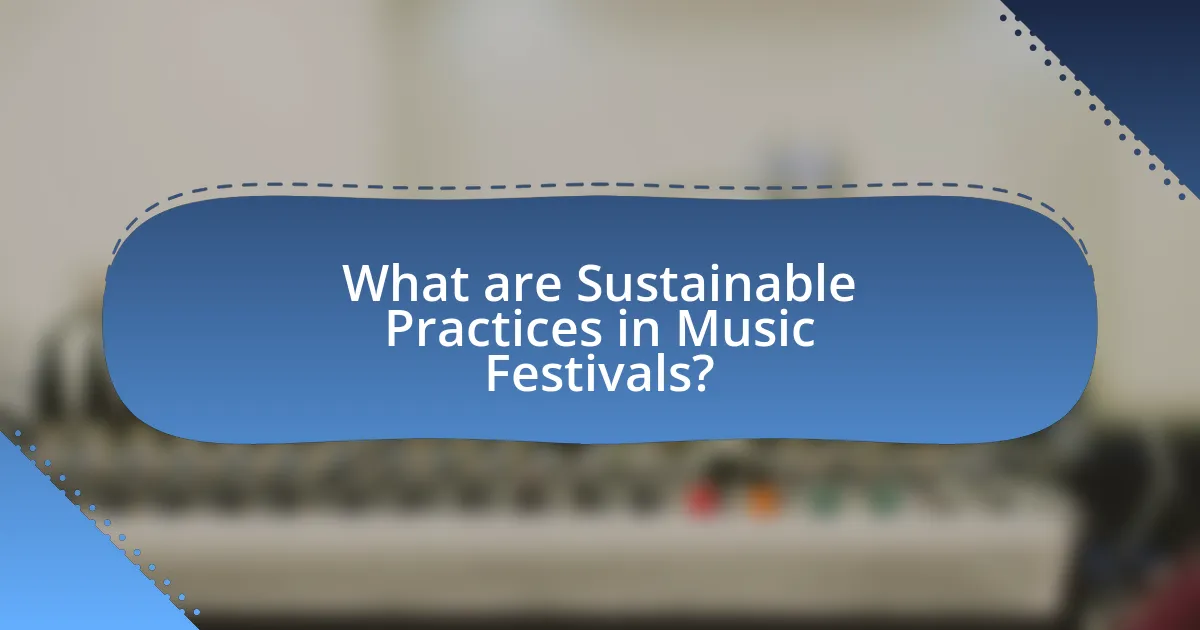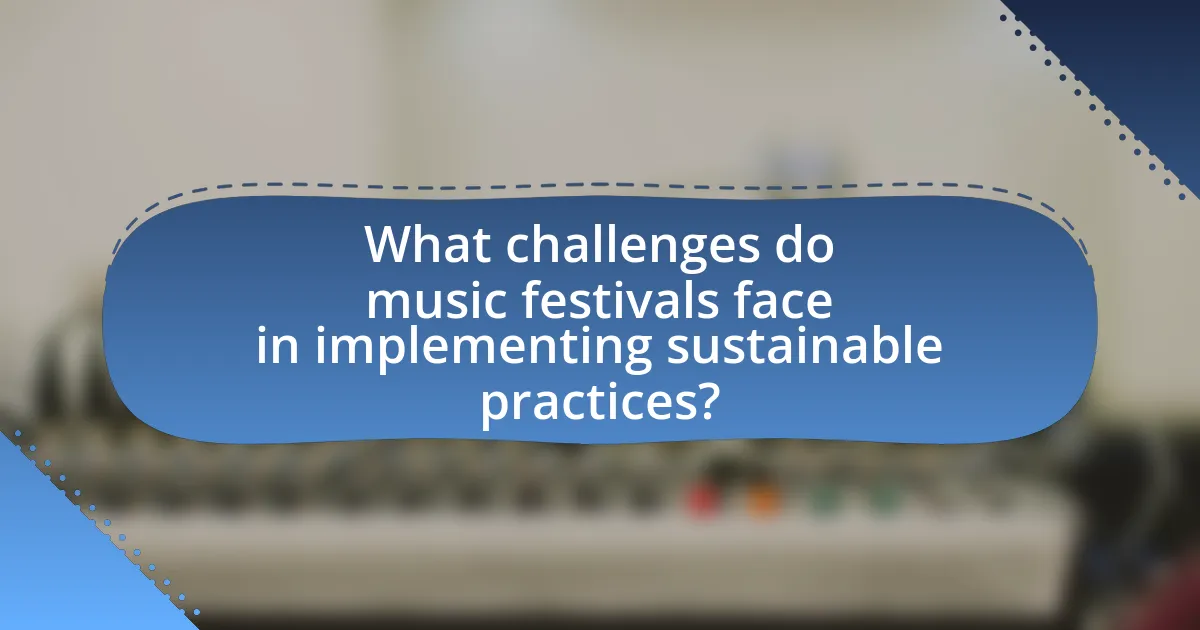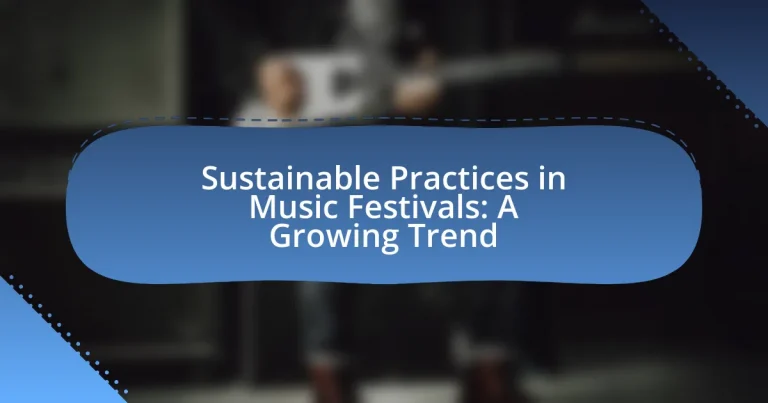Sustainable practices in music festivals encompass environmentally friendly initiatives aimed at minimizing the ecological footprint of these events. Key components include waste management strategies such as recycling and composting, the use of renewable energy sources, and promoting sustainable transportation options. The article highlights the importance of sustainability in reducing environmental impacts, the challenges faced by festival organizers, and the benefits of adopting eco-friendly practices, including enhanced attendee experiences and potential economic advantages. It also discusses innovative solutions and community engagement as essential elements in fostering a culture of sustainability within the music festival industry.

What are Sustainable Practices in Music Festivals?
Sustainable practices in music festivals refer to environmentally friendly initiatives aimed at reducing the ecological footprint of these events. These practices include waste management strategies such as recycling and composting, the use of renewable energy sources like solar power, and promoting sustainable transportation options for attendees. For instance, festivals like Glastonbury have implemented extensive recycling programs, achieving a 50% waste diversion rate, while others, such as Coachella, have invested in solar energy to power stages. These efforts not only minimize environmental impact but also raise awareness among festival-goers about sustainability issues.
Why is sustainability important in the context of music festivals?
Sustainability is important in the context of music festivals because it minimizes environmental impact and promotes social responsibility. Music festivals often generate significant waste, consume large amounts of energy, and contribute to carbon emissions. For instance, a study by the University of California found that a single large festival can produce over 1,000 tons of waste, highlighting the need for sustainable practices. Implementing sustainability measures, such as waste reduction, renewable energy use, and eco-friendly transportation, not only helps protect the environment but also enhances the festival’s reputation and attracts environmentally conscious attendees.
What environmental impacts do music festivals have?
Music festivals have significant environmental impacts, primarily through waste generation, energy consumption, and land degradation. For instance, a study by the University of California found that large festivals can produce up to 1,000 tons of waste, with only a fraction being recycled. Additionally, the energy used for stages, lighting, and sound systems often relies on fossil fuels, contributing to greenhouse gas emissions. Furthermore, the physical footprint of festivals can lead to soil compaction and habitat destruction, particularly in natural settings. These factors highlight the urgent need for sustainable practices in the music festival industry to mitigate their environmental footprint.
How can sustainability mitigate these impacts?
Sustainability can mitigate the negative impacts of music festivals by implementing eco-friendly practices that reduce waste, conserve resources, and lower carbon emissions. For instance, festivals that adopt zero-waste policies can divert up to 90% of their waste from landfills through recycling and composting initiatives. Additionally, utilizing renewable energy sources, such as solar power, can significantly decrease the carbon footprint associated with energy consumption at these events. Research from the Green Music Initiative indicates that festivals that prioritize sustainability not only enhance their environmental performance but also improve attendee satisfaction and engagement, demonstrating that sustainable practices can lead to a more responsible and enjoyable festival experience.
What are the key components of sustainable practices in music festivals?
The key components of sustainable practices in music festivals include waste management, energy efficiency, water conservation, and community engagement. Effective waste management involves implementing recycling and composting programs to minimize landfill contributions; for instance, festivals like Glastonbury have reported diverting over 50% of waste from landfills through such initiatives. Energy efficiency can be achieved by utilizing renewable energy sources, such as solar panels, which have been adopted by festivals like Coachella, reducing their carbon footprint significantly. Water conservation practices, such as providing refillable water stations, help reduce plastic waste and promote sustainable hydration options. Lastly, community engagement fosters local partnerships and supports regional economies, as seen in festivals that prioritize local vendors and artists, enhancing the overall sustainability of the event.
What types of waste management strategies are implemented?
Various waste management strategies implemented at music festivals include recycling, composting, waste reduction initiatives, and the use of biodegradable materials. Recycling programs are established to sort and process materials like plastics, metals, and paper, significantly reducing landfill contributions. Composting efforts convert organic waste into nutrient-rich soil, promoting sustainability. Waste reduction initiatives focus on minimizing single-use items and encouraging attendees to bring reusable containers. Additionally, the adoption of biodegradable materials helps decrease the environmental impact of waste. These strategies collectively aim to enhance sustainability and reduce the ecological footprint of music festivals.
How do renewable energy sources play a role in sustainability?
Renewable energy sources significantly contribute to sustainability by providing clean, inexhaustible energy that reduces greenhouse gas emissions. For instance, solar and wind energy systems generate electricity without releasing carbon dioxide, which is crucial for combating climate change. According to the International Renewable Energy Agency (IRENA), transitioning to renewable energy could reduce global CO2 emissions by up to 70% by 2050. This shift not only mitigates environmental impact but also promotes energy independence and economic resilience, as renewable resources are locally sourced and can create jobs in installation and maintenance.
How are music festivals adopting sustainable practices?
Music festivals are adopting sustainable practices by implementing waste reduction strategies, utilizing renewable energy sources, and promoting eco-friendly transportation options. For instance, many festivals now encourage attendees to use public transport or carpooling, significantly reducing carbon emissions. Additionally, festivals like Glastonbury have introduced extensive recycling programs, aiming to divert over 50% of waste from landfills. Furthermore, the use of solar panels and wind turbines for power generation is becoming increasingly common, with events such as Coachella showcasing solar-powered stages. These initiatives reflect a growing commitment within the music festival industry to minimize environmental impact and promote sustainability.
What initiatives are leading festivals taking to promote sustainability?
Leading festivals are implementing various initiatives to promote sustainability, including waste reduction programs, renewable energy usage, and eco-friendly transportation options. For instance, festivals like Glastonbury have introduced a comprehensive waste management system that aims to minimize landfill contributions by encouraging recycling and composting. Additionally, Coachella has committed to using solar power to meet a significant portion of its energy needs, showcasing a shift towards renewable energy sources. Furthermore, many festivals are partnering with local transportation services to provide shuttle options, reducing the carbon footprint associated with attendee travel. These initiatives reflect a growing trend in the festival industry to prioritize environmental responsibility and sustainability.
How do partnerships with eco-friendly organizations enhance sustainability efforts?
Partnerships with eco-friendly organizations enhance sustainability efforts by providing expertise, resources, and credibility to initiatives aimed at reducing environmental impact. These collaborations often lead to the implementation of best practices in waste management, energy efficiency, and sustainable sourcing, which are critical in large-scale events like music festivals. For instance, festivals that partner with organizations such as the Green Music Initiative have reported significant reductions in waste, with some achieving up to 90% waste diversion from landfills. This demonstrates that such partnerships not only improve operational practices but also foster a culture of sustainability among attendees and stakeholders, ultimately contributing to broader environmental goals.

What challenges do music festivals face in implementing sustainable practices?
Music festivals face significant challenges in implementing sustainable practices, primarily due to logistical complexities, financial constraints, and stakeholder engagement. Logistical complexities arise from the need to manage waste, transportation, and energy consumption effectively, which can be overwhelming for large-scale events. Financial constraints often limit the ability of festival organizers to invest in sustainable technologies and practices, as initial costs can be high despite potential long-term savings. Additionally, engaging stakeholders, including vendors, attendees, and local communities, poses a challenge, as differing priorities and levels of commitment can hinder cohesive sustainability efforts. These factors collectively impede the transition towards more sustainable festival operations.
What are the common barriers to adopting sustainability in festivals?
Common barriers to adopting sustainability in festivals include high costs, lack of awareness, and logistical challenges. High costs often deter festival organizers from implementing sustainable practices, as initial investments in eco-friendly infrastructure and materials can be significant. Lack of awareness among attendees and organizers about the benefits of sustainability can lead to insufficient demand for green initiatives. Logistical challenges, such as waste management and sourcing sustainable vendors, complicate the implementation of sustainable practices. According to a study by the University of California, 70% of festival organizers cite budget constraints as a primary barrier to sustainability efforts.
How do financial constraints affect sustainability initiatives?
Financial constraints significantly hinder sustainability initiatives by limiting the resources available for implementing eco-friendly practices. For instance, music festivals often rely on ticket sales and sponsorships, and when budgets are tight, organizers may prioritize immediate financial returns over long-term sustainability goals. A study by the Green Music Initiative found that 70% of festival organizers cited budget limitations as a primary barrier to adopting sustainable practices. This financial pressure can lead to reduced investment in renewable energy sources, waste management systems, and sustainable transportation options, ultimately compromising the effectiveness of sustainability efforts in the festival sector.
What logistical challenges arise in implementing eco-friendly practices?
Implementing eco-friendly practices in music festivals presents several logistical challenges, including waste management, resource sourcing, and transportation. Waste management becomes complex as festivals must ensure proper disposal and recycling of materials, which requires efficient systems and trained personnel. Resource sourcing is challenging due to the need for sustainable materials, which may not be readily available or may come at a higher cost. Transportation logistics also complicate the implementation of eco-friendly practices, as organizers must consider the carbon footprint of transporting equipment and attendees, often necessitating the use of greener transport options. These challenges highlight the need for careful planning and collaboration with eco-conscious vendors and service providers to effectively integrate sustainable practices into festival operations.
How can festivals overcome these challenges?
Festivals can overcome challenges related to sustainability by implementing comprehensive waste management systems, promoting eco-friendly transportation options, and engaging in community partnerships. Effective waste management systems, such as recycling and composting initiatives, can significantly reduce landfill contributions; for instance, the Glastonbury Festival achieved a 50% reduction in waste sent to landfills by adopting such practices. Additionally, encouraging attendees to use public transport or carpooling can lower carbon footprints; the Coachella Valley Music and Arts Festival reported a 20% increase in public transport usage after introducing incentives. Lastly, collaborating with local organizations can enhance resource sharing and community support, as seen in the partnership between the Bonnaroo Music and Arts Festival and local environmental groups, which has led to increased awareness and participation in sustainability efforts.
What innovative solutions have been proposed to enhance sustainability?
Innovative solutions proposed to enhance sustainability in music festivals include the implementation of zero-waste policies, the use of renewable energy sources, and the introduction of eco-friendly transportation options. Zero-waste policies aim to minimize waste generation by promoting recycling and composting, which can significantly reduce landfill contributions. For instance, festivals like Glastonbury have adopted such policies, achieving over 50% waste diversion rates. Renewable energy sources, such as solar panels and wind turbines, are increasingly utilized to power festival operations, reducing reliance on fossil fuels; Coachella has successfully integrated solar energy into its infrastructure. Additionally, eco-friendly transportation options, including bike-sharing programs and electric shuttle services, encourage attendees to reduce their carbon footprint, as seen in events like the Bonnaroo Music and Arts Festival, which promotes carpooling and public transport. These solutions collectively contribute to a more sustainable festival experience.
How can community engagement support sustainable practices?
Community engagement can support sustainable practices by fostering collaboration among stakeholders, which leads to more effective implementation of eco-friendly initiatives. When local communities actively participate in decision-making processes, they contribute valuable insights and resources that enhance sustainability efforts. For instance, research from the Journal of Environmental Management indicates that community-led initiatives in festivals can reduce waste by up to 30% through localized recycling programs and volunteer efforts. This active involvement not only increases awareness but also cultivates a sense of ownership, motivating individuals to adopt sustainable behaviors beyond the event itself.

What are the benefits of sustainable practices in music festivals?
Sustainable practices in music festivals provide environmental, economic, and social benefits. Environmentally, these practices reduce waste and carbon footprints, as seen in festivals that implement recycling and composting programs, which can divert up to 90% of waste from landfills. Economically, sustainable practices can lower operational costs through energy efficiency and resource conservation, with studies indicating that festivals adopting green technologies can save up to 30% on energy expenses. Socially, these practices enhance community engagement and promote awareness of environmental issues, fostering a culture of sustainability among attendees and local residents.
How do sustainable practices enhance the festival experience for attendees?
Sustainable practices enhance the festival experience for attendees by creating a more enjoyable and responsible environment. These practices, such as waste reduction, eco-friendly transportation, and local sourcing of food, contribute to a cleaner and healthier atmosphere, which attendees appreciate. For instance, festivals that implement recycling and composting programs can significantly reduce waste, leading to a more pleasant experience for participants. Additionally, using renewable energy sources, like solar power, not only minimizes the carbon footprint but also fosters a sense of community and shared values among attendees, enhancing their overall enjoyment. Research indicates that 70% of festival-goers prefer events that prioritize sustainability, demonstrating that these practices resonate positively with the audience.
What role does attendee awareness play in promoting sustainability?
Attendee awareness plays a crucial role in promoting sustainability by influencing individual behaviors and collective actions at events. When attendees are informed about sustainable practices, they are more likely to engage in eco-friendly behaviors, such as reducing waste, recycling, and conserving resources. Research indicates that events with strong sustainability messaging can lead to a 30% increase in attendees adopting sustainable practices, as seen in the 2021 Green Music Festival report, which highlighted that informed attendees actively participated in waste reduction initiatives. This awareness not only enhances the overall sustainability of the event but also fosters a culture of environmental responsibility among participants, encouraging them to carry these practices into their daily lives.
How can sustainability initiatives improve a festival’s reputation?
Sustainability initiatives can significantly enhance a festival’s reputation by demonstrating a commitment to environmental responsibility and community engagement. Festivals that implement eco-friendly practices, such as waste reduction, renewable energy use, and sustainable sourcing, attract environmentally conscious attendees and sponsors. For instance, a study by the University of California found that 70% of festival-goers prefer events that prioritize sustainability, leading to increased ticket sales and positive media coverage. This alignment with consumer values not only boosts attendance but also fosters loyalty among participants, enhancing the overall brand image of the festival.
What economic advantages do sustainable practices offer to festival organizers?
Sustainable practices offer significant economic advantages to festival organizers by reducing operational costs and enhancing revenue opportunities. Implementing waste reduction strategies, such as recycling and composting, can lower disposal fees and minimize the need for waste management services, leading to cost savings. Additionally, festivals that prioritize sustainability often attract a larger audience, as consumers increasingly prefer environmentally responsible events. This increased attendance can result in higher ticket sales and greater vendor participation, ultimately boosting overall revenue. A study by the Green Music Initiative found that festivals adopting sustainable practices saw a 20% increase in ticket sales compared to those that did not prioritize sustainability.
How can cost savings be achieved through sustainable practices?
Cost savings can be achieved through sustainable practices by reducing resource consumption and minimizing waste. For instance, implementing energy-efficient technologies can lower electricity costs, while using biodegradable materials can decrease waste disposal expenses. A study by the Green Music Initiative found that festivals adopting sustainable practices reported up to a 30% reduction in operational costs. Additionally, engaging in local sourcing can cut transportation costs and support the local economy, further enhancing financial savings.
What potential revenue streams can arise from eco-friendly initiatives?
Potential revenue streams from eco-friendly initiatives include increased ticket sales, sponsorship opportunities, merchandise sales, and grants or funding from environmental organizations. Eco-friendly practices attract environmentally conscious attendees, leading to higher ticket sales; for example, festivals that implement sustainability measures often report a 20% increase in attendance. Sponsorship from brands aligned with sustainability can provide significant financial support, as companies seek to enhance their image through association with green initiatives. Additionally, selling eco-friendly merchandise, such as reusable cups or biodegradable products, can generate extra revenue. Grants from organizations focused on environmental sustainability can also provide funding to support these initiatives, further enhancing the financial viability of eco-friendly practices in music festivals.
What are some best practices for implementing sustainability in music festivals?
Best practices for implementing sustainability in music festivals include reducing waste, utilizing renewable energy sources, and promoting sustainable transportation options. Reducing waste can be achieved through strategies such as providing recycling and composting stations, which have been shown to decrease landfill contributions significantly; for example, the Glastonbury Festival reported a 50% reduction in waste through effective recycling initiatives. Utilizing renewable energy sources, such as solar or wind power, not only lowers carbon emissions but also enhances the festival’s environmental credibility; the Coachella Valley Music and Arts Festival has successfully implemented solar energy solutions, powering a significant portion of its operations. Promoting sustainable transportation options, like encouraging carpooling or providing shuttle services, can reduce the carbon footprint associated with attendee travel; studies indicate that festivals implementing such measures can see a 30% decrease in transportation-related emissions.
What steps can festival organizers take to start their sustainability journey?
Festival organizers can start their sustainability journey by conducting a comprehensive sustainability assessment to identify areas for improvement. This assessment allows organizers to evaluate their current practices, such as waste management, energy consumption, and transportation logistics. Following the assessment, they should set measurable sustainability goals, such as reducing waste by 50% or sourcing 100% renewable energy for the event. Implementing initiatives like encouraging the use of reusable containers, providing recycling stations, and partnering with local vendors for sustainable food options can further enhance their efforts. Research indicates that festivals adopting sustainable practices can significantly reduce their environmental impact, with events like Glastonbury Festival reporting a 50% reduction in waste through effective recycling and composting programs.
How can festivals measure the success of their sustainability efforts?
Festivals can measure the success of their sustainability efforts through various metrics such as waste reduction, carbon footprint analysis, and attendee feedback. By tracking the amount of waste generated and the percentage diverted from landfills, festivals can quantify their impact on waste management. For instance, a festival that implements a comprehensive recycling program may report a 50% reduction in waste sent to landfills compared to previous years. Additionally, conducting a carbon footprint analysis allows festivals to assess their greenhouse gas emissions, providing a clear picture of their environmental impact. Surveys and feedback from attendees can also offer insights into public perception of sustainability initiatives, helping festivals gauge the effectiveness of their efforts. These combined metrics provide a robust framework for evaluating sustainability success.


